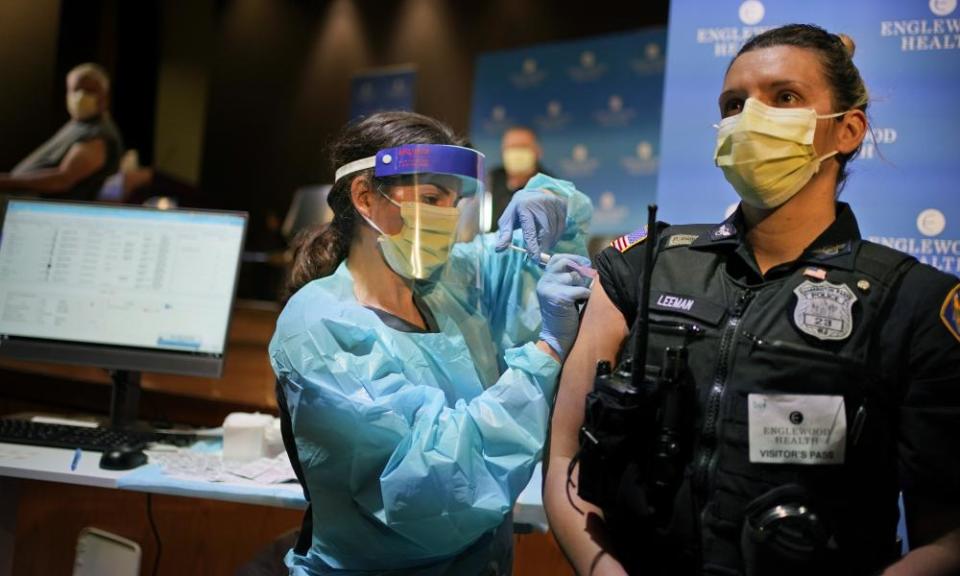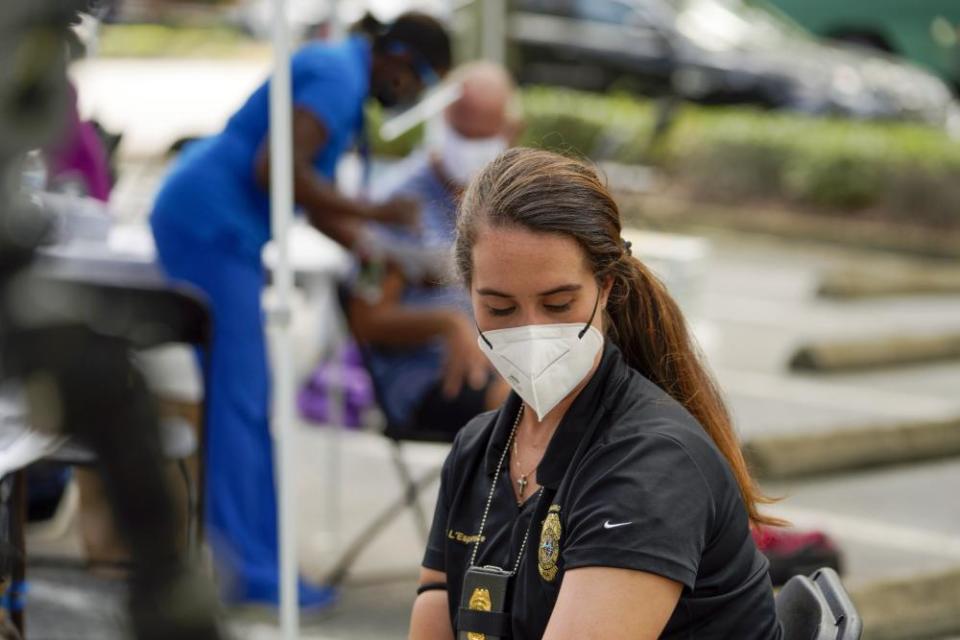Police departments face a shortage as unions enable officers to refuse vaccines

Sgt Randy Huserik and all other officers with the Seattle police department who have been vaccinated against Covid-19 are prepared to report at 7am Tuesday morning to any of the city’s five precincts rather than their usual assignments. Some detectives could even be responding to 911 calls instead of following up on their case load, he said.
That’s because the city is implementing a vaccine mandate for officers on 18 October and preparing to fire hundreds of officers who refuse to get the vaccine, which could leave the department significantly understaffed.
“We will have additional bodies available to handle 911 calls but obviously there is going to be a backlash on that for all the officers assigned as detectives who then won’t be working on their caseload, which will then back up as additional cases come in,” said Huserik, who has been with the department for 28 years and works in public affairs.
Related: Top California law enforcement agencies report vaccination rates far lower than public
The standoff between the city and officers is just one conflict among many across the United States, with city leaders stating that they are trying to keep the public safe and some officers and their union representatives saying that the mandates violate their rights. In Chicago, the issue has even led to the mayor and the local police union trading legal actions.
While the penalties for officers who decline to get the vaccine differ from city to city, there is a common resistance among police unions to various restrictions.
And policing experts warn that even if officers’ resistance to the vaccination is misguided, issuing mandates could further deplete departments that are already understaffed and thus hurt public safety.
“I think you should encourage them, but I don’t think you can make anybody do anything and think that relationship is going to be amicable and trustworthy down the line,” said David Thomas, a professor of forensic studies at Florida Gulf Coast University.
The resistance to the vaccines comes despite the fact Covid-19 has caused 473 deaths among law enforcement officers in the United States, making it the largest cause of death for the group in 2020 and 2021, according to Officer Down Memorial Page, which tracks the deaths.
“You would think that is enough to encourage everybody to get vaccinated,” said Chuck Wexler, the executive director of the Police Executive Research Forum, which advises police departments across the country. “It’s just mind-boggling to think that the creation of [police] unions was to protect officers’ rights and what could be more significant than the right to live a good life?”

Brian Higgins, a former police chief and adjunct professor at John Jay College of Criminal Justice, attributes the resistance in part to the fact that police “are a little more skeptical” and “are not used to being told what to do”, he said.
Higgins also said there is a perception that the claims about the benefits of the vaccines have changed. Officers are aware that you can still contract and spread the virus even after you have received the vaccine. The vaccines, however, do hugely reduce the risk of contracting and spreading the virus and getting seriously ill, according to the Centers for Disease Control and Prevention, and are safe to take. The vast majority of hospitalisation and deaths due to Covid-19 are with unvaccinated people, not so called “breathe through” infections of those who have had the jabs.
However, Higgins cautions on tarring all vaccine hesitant police officers with one brush.
“The assumption is that they are conspiracy theorists, that they are anti-government, and that’s not really true,” said Higgins. “You have people who have honest concerns or have figured that since they have had Covid once or twice, they are building up antibodies and those antibodies are good enough.”
In Wisconsin, the Milwaukee Police Supervisors’ Organization reached an agreement earlier this week with the city that requires union members to be vaccinated or wear masks while on duty except when eating or drinking at a safe distance from others, according to the Milwaukee Journal-Sentinel. If they repeatedly break the rules, officers could face termination.
Andrew Wagner, acting president of the Milwaukee Police Association, does not support the deal, even though he acknowledges that it’s better than a complete mandate like Seattle.
“We are still in good faith negotiating with the city to try to reduce those penalties for our officers,” said Wagner.
For some police unions, the vaccine requirement, like requirements to wear body cameras, is a change in work conditions and therefore demands negotiations, said Wexler, who has led the research forum since 1993.
“Labor is saying you can’t just do that. You have to bargain first. In other words, they want something from management for their willingness to get vaccinated,” Wexler said.
Sandra C Quinn, a professor of family science at University of Maryland School of Public Health who has studied the role of communication in vaccine acceptance, said that ongoing discussions between vaccine hesitant officers and health workers or officers who have become sick with Covid can increase the vaccination numbers.
“We have seen in the health care setting that people who have been vaccine refusers have been willing to change their stance,” said Quinn.
Still, Quinn thinks mandates are also effective.

In Chicago, the city instituted a requirement for officers to report their vaccination status by Friday. Those who are not vaccinated must submit to semiweekly coronavirus testing. If they refuse, they will be placed on unpaid leave.
John Catanzara, president of the Fraternal Order of Police (FOP), sued over the mandate and suggested that if the city enforces its requirement and many union members refuse to comply with it, “it’s safe to say that the city of Chicago will have a police force at 50% or less for this weekend coming up”, the Associated Press reported.
Mayor Lori Lightfoot countered that the city is “focused on making sure that we maximize the opportunity to create a very safe workplace. The data is very clear. It is unfortunate that the FOP leadership has chosen to put out a counter-narrative.”
Regardless of the merits of officers’ refusal to get the vaccine, Thomas, the Florida professor and a retired police officer, thinks encouraging employees or offering cash incentives – as some counties in Florida did – is more effective than punishments, which risk worsening staff shortages.
“You won’t have any people to respond to calls for service because they made this decision that they are going to terminate people,” Thomas said of cities like Seattle, which has already lost 300 officers over the past year, according to KOMO, a local TV station.
On 6 October, 292 officers in the city had not yet provided proof of vaccination and 111 had filed exemption requests, representing more than a third of the force.
“Folks are on pins and needles because we don’t know what the numbers are going to look like after Monday,” said Huserik of the Seattle police.
But the mandate does appear to have encouraged some officers to get the vaccine. By 14 October, 171 officers had not submitted proof of vaccination, representing a 41% decrease from a week earlier.
“I think mandates are going to bring people around,” said Quinn. “I have been in health care settings where people are saying, ‘I’m going to quit. I’m going to quit,’ but when push comes to shove, they get vaccinated.”

 Yahoo Finance
Yahoo Finance 